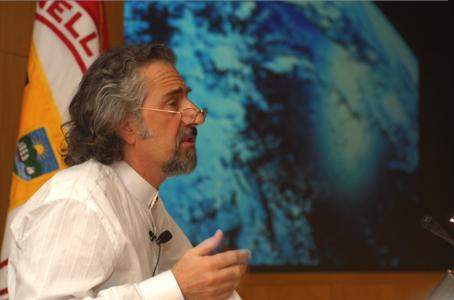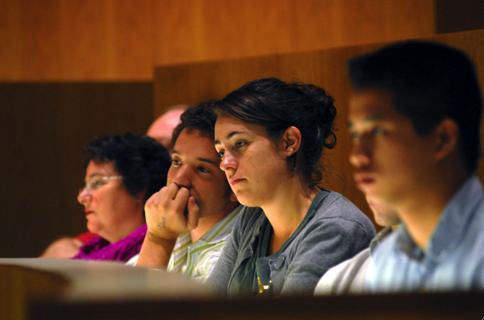Professor’s Farewell Poetry Packs the House
April 2009

Like his poetry, Peter Fortunato's lecture moved gracefully through a
range of topics and perspectives.
A farewell poetry reading by a senior professor drew a full-house crowd, including admiring students, to hear the second presentation in the Weill Cornell Medical College in Qatar’s April Literary Lecture Series. Peter Fortunato, poet, performer and senior literature lecturer at WCMC-Q, shared memories of his four years in Doha and the poems they inspired as well as thoughts on poetry itself.
“A poem is a form like no other written form, because with concision it can move among so many different subjects and it can be so full of allusions,” Fortunato explained.
Throughout his hour-long reading, entitled “Doha Ma'alsalama,” or “go in peace” in English, Fortunato invited the audience into his world and works, explaining the inspiration behind each poem before he read it. From horseback riding along the shore to the traffic in Doha, he crafted his experiences into imagery and even sound effects that he expressed. Yet even with all of the activity and ruckus, Doha, he explained, is still essentially desert.
“Three o’clock in the morning with rock choppers going in the distance, channel surfing, seeing great art from Florence and maybe coming upon an Italian poet, wondering what my wife is doing back in America at that hour—that is a kind of desert solitude, a kind of space for contemplation,” he said.
And there’s a lot to contemplate—four years in Doha means seeing more change than one would likely see anywhere else in the world today.
"Peacefully: squad of working guys in blue cover-alls knocking cement forms off of poured, hardened walls, two yellow building cranes to hoist and swing away the frames, gracefully. But this only takes me so far," Fortunato read from his poem entitled “Doha Ma’alsalama.”

Fortunato's careful explanations and captivating poetry grabbed
and kept the attention of the crowded lecture hall.
Through the lecture, Fortunato also visited the topics of death, classical figures in history and literature, and childhood memories stirred up by travel.
“Part of an expat experience is that you remember things vividly from your childhood and homeland. You remember things that are far away but your imagination realizes that you can quickly make them present, even in your sleeping dreams,” he said.
Filling a front section of the lecture hall were WCMC-Q students who Fortunato said arranged to take their chemistry exams two hours early just to hear him speak. Amidst the loud, prolonged clapping at the program’s end, they gave him a standing ovation for all that he had shared.
“There’s a kind of madness in poetry. Why would anyone dedicate themselves to it if they had another option? As I often say, don’t do it unless you can’t not do it,” Fortunato said.
Report by Emily Alp
